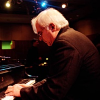Home » Jazz Articles » Roads Less Travelled » Harry Beckett: Wide Open Roads
Harry Beckett: Wide Open Roads
 As discussed in the last article in this series, the dissemination of jazz on record, together with the abilities of musicians from outside of the USA, ensured that the jazz language was relatively quickly assimilated on a large scale. So far as the British jazz scene was concerned, the Jamaican trumpeter Dizzy Reece, born January 5, 1931, was making an impact by the mid-1950s, and just over a decade later both the Canadian Kenny Wheeler and Reece's fellow West Indian Harry Beckett, born in Barbados, were bringing their own highly personal approaches to the trumpet to the cultural stew of the mid- to late 1960s.
As discussed in the last article in this series, the dissemination of jazz on record, together with the abilities of musicians from outside of the USA, ensured that the jazz language was relatively quickly assimilated on a large scale. So far as the British jazz scene was concerned, the Jamaican trumpeter Dizzy Reece, born January 5, 1931, was making an impact by the mid-1950s, and just over a decade later both the Canadian Kenny Wheeler and Reece's fellow West Indian Harry Beckett, born in Barbados, were bringing their own highly personal approaches to the trumpet to the cultural stew of the mid- to late 1960s. Such is the distinctiveness of Beckett's playing that it continues to be the musical equivalent of DNA, and the elements of it were in place by the time he gained a significant break on record in the band of bassist and composer Graham Collier. Down Another Road, recorded in March of 1969, finds Beckett playing flugelhorn exclusively, and it's a tribute both to his musicianly abilities and Collier's talents as a writer that the seventeen and a half minutes of Danish Blue hold the attention. Beckett here is trenchantly lyrical despite the fact that that description is almost a contradiction in terms. The contrast between him and trombonist Nick Evans, whose playing is nothing if not extrovert and blowsy, is marked not only by approach but also by setting, a mark in itself of Collier's sensitivity to the characteristics of his sidemen.
For all of Beckett's abilities within the established values of jazz at the end of the 1960s, it's important not to overlook the fact that the fusion genre took a few years to resolve itself into the idiom of interminable solos and the electric piano. Much of the music produced in this period, the most fertile efforts of Soft Machine for example, effectively soundtracks a period of cultural flux which, for all of its lapses into self-indulgence, still managed to produce music that is as redolent of its time as anything ever produced by the first wave of boppers. August 1970 found both Beckett and Evans working with guitarist Ray Russell on his Rites And Rituals album, which to this day has a faintly disturbing edge. When the clouds long enough for Beckett to have his say on the title track he maintains his musical personality with ease even though he's working in a musical environment that seems to be coming apart at the seams. Such music can only have been the product of ambition which, for all of its weakness for overreaching, at least made for music that must have had any fledgling marketing department getting out of the kitchen because of the heat.
As the 1970s progressed the British jazz scene maintained creative momentum. Elton Dean's band Ninesense, in which Beckett replaced the South African Mongezi Feza, who sadly died prematurely, made a session for BBC Radio 3 in March of 1978. Here Beckett is right at home in a band made up of players who'd all served apprenticeships on the scene, and contributed much to the growing depth of British jazz at a time when the commercial fortunes of the music were not at their highest.
Such has been the breadth of Beckett's musical interests, from post-bop to free improvisation, that finding him working in 2000 with the London Improvisers Orchestra is symptomatic of his musical philosophy. On the orchestral improvisation Proceeding 3 his trumpet is but one voice in a ddemocratic ensemble where, if anything, the very notion of the virtuoso soloist, motivated solely by the opportunity for ever greater technical display, is negated.
If 'the sound of surprise' is amongst the very things that makes jazz and improvised music what it is, then Harry Beckett has in his career pulled off the not inconsiderable feat of melding that very sound with a highly personal style and has thus succeeded in making music which is never less than worthwhile.
SELECTED DISCOGRAPHY
- Graham Collier Sextet— Down Another Road (1969) and Disconforme DISC 1958 CD (1999 reissue)
- Harry Beckett— Flare Up (1970??) -Jazzprint JPVP124CD (2002 reissue)
- Ray Russell— Rites And Rituals -Columbia 494436 2 (1999 reissue)
- Graham Collier Music— Mosaics (1971) -Disconforme DISC 1960 CD (1999 reissue)
- Elton Dean's Ninesense— Live At The BBC (1975, 1978) -Hux 046
- The Dedication Orchestra— Spirits Rejoice (1992) -Ogun OGCD101
- London Improvisers Orchestra—The Hearing Continues (2000) -Emanem 4203
- Various Artists— Soupsongs Live: The Music Of Robert Wyatt -Jazzprint JPVP101CD
Tags
PREVIOUS / NEXT
Support All About Jazz
 All About Jazz has been a pillar of jazz since 1995, championing it as an art form and, more importantly, supporting the musicians who make it. Our enduring commitment has made "AAJ" one of the most culturally important websites of its kind, read by hundreds of thousands of fans, musicians and industry figures every month.
All About Jazz has been a pillar of jazz since 1995, championing it as an art form and, more importantly, supporting the musicians who make it. Our enduring commitment has made "AAJ" one of the most culturally important websites of its kind, read by hundreds of thousands of fans, musicians and industry figures every month.




















